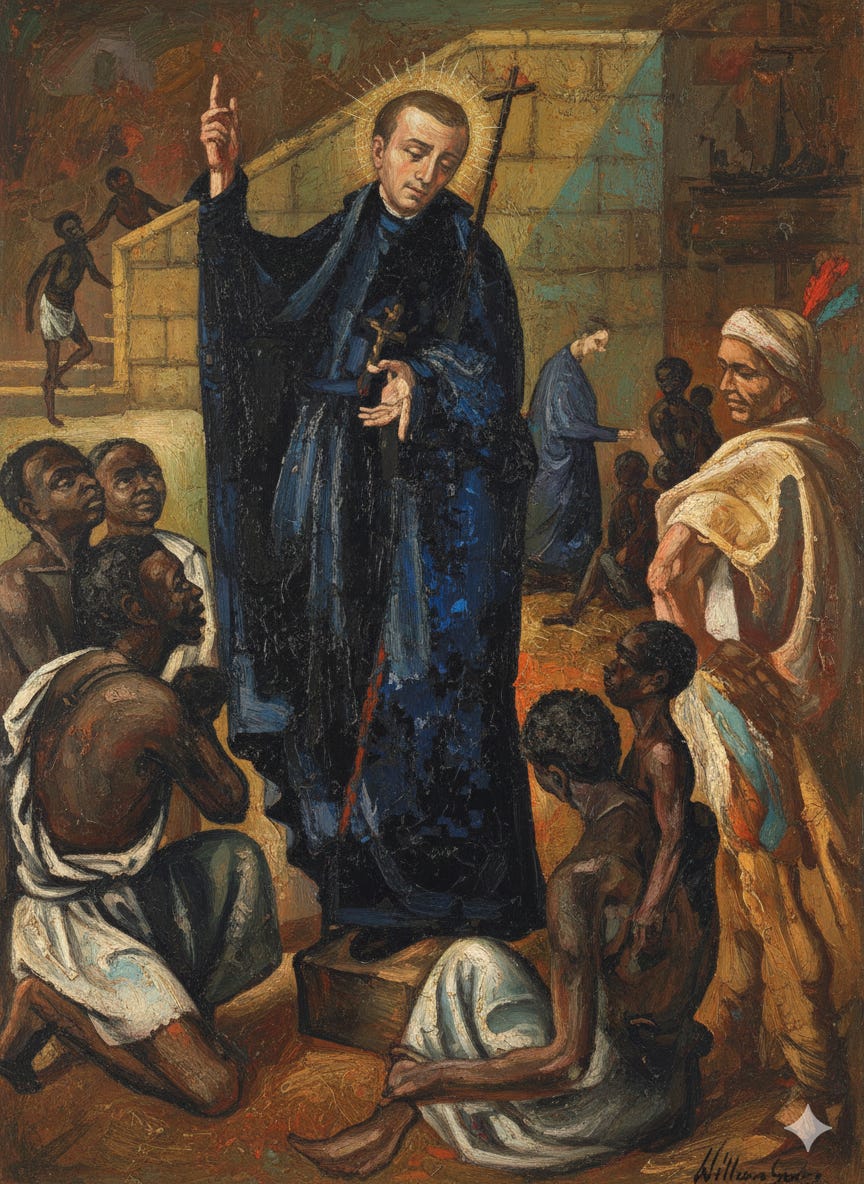A Reflection on the Holiness of Saint Peter Claver
Today is the Feast Day of Saint Peter Claver.
At Mass today I found myself reflecting on his life and his radical embrace of the cross. He was truly a servant of the most forgotten. His whole life embodied the words of Jesus: “Truly, I say to you, as you did it to one of the least of these my brethren, you did it to me” (Matt 25:40). He was the servant of the most forgotten, the enslaved Africans brought in chains to Cartagena.
What strikes me first is his humility. His missionary vocation took a decisive turn not because of a bishop or theologian, but because of the counsel of a doorkeeper. A doorkeeper was usually a brother with little education and skill, often unnoticed by the world. Yet Peter listened to him. True holiness always listens, especially when God speaks through unexpected and lowly voices. The Catechism reminds us that “Faith is a personal act … but it is not an isolated act. No one can believe alone” (CCC 166). Peter’s openness to receive guidance from a humble source is already the mark of a saint.
Secondly, his ministry was a witness to justice and mercy in a time of compromise. While the Church clearly taught that slavery was evil, many in Cartagena’s local hierarchy ignored this truth for the sake of wealth and power. Peter refused to be silent. He met the slaves as brothers, washed their wounds, fed them, and catechized them in the faith. He lived the Beatitudes (Mt 5:3–12) in radical concreteness: comforting the afflicted, thirsting for righteousness, and becoming “merciful” as the Father is merciful (Lk 6:36). The Corporal Works of Mercy—feeding the hungry, clothing the naked, caring for the sick—were his daily bread. So too the Spiritual Works of Mercy—teaching, consoling, forgiving. He showed that the Gospel is never abstract but always flesh and blood.
This radical discipleship brought him suffering. Many called him obstinate and troublesome. Some refused to worship in churches where he ministered to slaves. At the end of his life, abandoned and mistreated, he entered into the mystery of Christ’s Passion. Like the Master he followed, he was “despised and rejected” (Isa 53:3), yet he remained steadfast in hope. He even saw his last sufferings as penance for his own sins, never as a complaint against God.
Here lies the deepest teaching of his life: union with Christ through the cross. The Compendium of the Catechism reminds us: “By his passion and death on the cross Christ has given a new meaning to suffering: it can henceforth configure us to him and unite us with his redemptive Passion” (Compendium, 314). Saint Peter Claver accepted this configuration to Christ to the very end.
We, too, know what it is to face betrayal, disappointment, and misunderstanding—even within the Church. We have also, sadly, been guilty of such neglect toward others. Peter Claver teaches us that our response must not be bitterness but mercy. His example calls us to listen humbly to the voices God places before us, even the hidden and simple. To act justly and mercifully even when unpopular or resisted. To persevere in hope when misunderstood or abandoned, uniting our trials to Christ.
On his feast day, let us ask the merciful Jesus, through the intercession of Saint Peter Claver, for a heart like his. May we be humble so that we can listen. May we have the boldness to act. May we be faithful to the end. We ask Jesus to heal us where we have failed in charity and to strengthen us to recognize him in the least of our brothers and sisters. May we live the mercy we hope to receive from our merciful Lord.
© 2025, Lawain McNeil, Mission Surrender, LLC.




A great Saint.
As usual, I so enjoyed this devo. Thanks, Lawain!